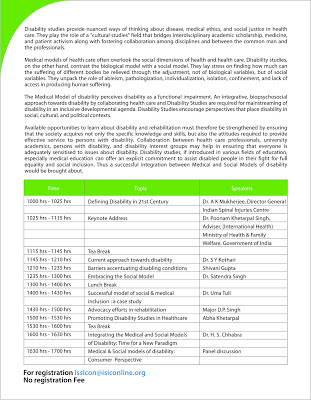Symposium on “Integrating the Medical and Social Models of Disability: Time for a New Paradigm 15th June, 2013
Following is the list of speakers and their topics:
1. Dr A K Mukherjee, ISIC- Defining Disability in 21st Century
2. Dr. Poonam K Singh, Advisor (International Health) MOHFW, GOI- Keynote address
3. Dr S Y Kothari, ISIC- Current approach towards disability
3. Dr S Y Kothari, ISIC- Current approach towards disability
4. Shivani Gupta, AccessAbility- Barriers accentuating disabling conditions
5. Dr Satendra Singh, UCMS - Embracing the Social Model: The UCMS experience
6. Dr. Uma Tuli, Amar Jyoti - Successful model of social & medical inclusion: a case study
7. Maj. DP Singh - Advocacy efforts in rehabilitation
5. Dr Satendra Singh, UCMS - Embracing the Social Model: The UCMS experience
6. Dr. Uma Tuli, Amar Jyoti - Successful model of social & medical inclusion: a case study
7. Maj. DP Singh - Advocacy efforts in rehabilitation
8. Abha Khetarpal, CTH - Promoting Disability Studies in Healthcare
9. Dr. H. S. Chhabra, ISIC - Integrating
the Medical and Social Models of Disability: Time for a New Paradigm
10. Panel discussion: Consumer perspective
Concept Note of the Symposium
Disability
studies provide nuanced ways of thinking about disease, medical ethics, and
social justice in health care. It plays the role of a cultural studies field
that bridges interdisciplinary academic scholarship, medicine, and patient
activism along with fostering collaboration among disciplines and between the
common man and the professionals.
Medical
models of health care often overlook the social dimensions of health and health
care. Disability studies, on the other hand, contrasts the biological model
with a social model. It lays stress on finding how much can the suffering of
different bodies be relieved through the adjustment, not of biological
variables, but of social variables. It unpacks the role of ableism,
pathologization, individualization, isolation, confinement, and lack of access
in producing human suffering.
The
Medical Model of disability perceives disability as a functional impairment. An
integrative, biopsychosocial approach towards disability by collaborating
health care and Disability Studies is required for mainstreaming of disability
in an inclusive developmental agenda. Disability Studies encourages
perspectives that place disability in social, cultural, and political contexts.
Available opportunities to learn about disability and
rehabilitation must therefore be strengthened by ensuring that the society
acquires not only the specific knowledge and skills, but also the attitudes
required to provide effective service to persons with disability. Collaboration
between health care professionals, university academics, persons with
disability, and disability interest groups may help in ensuring that everyone
is adequately sensitised to issues about disability. Disability studies, if
introduced in various fields of education, especially medical education can
offer an explicit commitment to assist disabled people in their fight for full
equality and social inclusion. Thus a successful integration between Medical
and Social Models of disability would be brought about.


This comment has been removed by a blog administrator.
ReplyDelete